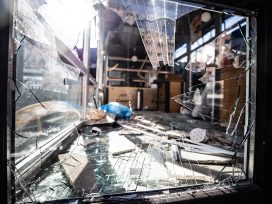Srebrenica. Ten years on
On 11 July, the atrocities of Srebrenica had their tenth anniversary. The massacre, in which Serbian troops murdered around 8000 Muslim boys and men, counts as one of the worst war crimes in Europe since WWII.
But the Serbs are only very gradually accepting guilt for this and other war crimes. Until recently, a cloak of silence lay over the crimes committed by the Serbian side. In a survey held last year among the Serbian population, practically no one was able to name a single Serbian war crime. The president, too, continued to deny that there existed incontrovertible proof for war crimes committed by Serbs.
For some time, there has been pressure on the Serbian government and the general public from various sides to engage with the traumatic past. Probably with success, as the president of the Belgrade Circle, Obrad Savic, states in his Eurozine contribution, “Srebrenica. Between denial and recognition”. His reason for saying so is that, by the middle of 2005, half of the population of Serbia is willing to accept that suspected war criminals must be put before the courts. Nevertheless, the majority of citizens of the Republic of Serbia and Montenegro still cannot imagine that the Serbian state as sole protector of rights could be capable of such monstrous crimes.
With the appearance of a video as a piece of evidence in the trial of the former Yugoslavian President Slobodan Milosevic at the beginning of June this year, it appears that the end has come for the collective self-deception that has enabled the Serbs to style themselves as victims. The video shows how six people with hands bound are lined up by Serbian soldiers and shot near Srebrenica.
Only a few days before the video surfaced, a group of NGOs, to whom the Belgrade Circle belongs, presented the Serbian national assembly with a “Declaration” of the recognition of the victims of Serbian war crimes; Eurozine republishes it here together with a text by Obrad Savic. The Declaration, which has been officially rejected, acknowledges the massacre of Srebrenica and other crimes against humanity committed by the Serbs.
The interview conducted by Danish authors Jens-Martin Eriksen and Frederik Stjernfelt with two of the authors of the “Memorandum”, which formed the ideological basis for Serbian nationalism, represents a sensation. The Memorandum, which was made public in 1986 at the Serbian Academy of Arts and Sciences, was understood by the other Yugoslavian part-republics as a declaration of war. It dealt with the supposed economic and cultural disadvantage of Serbia and revealed a similar fear of conspiracy against Serbia as the blindness towards Serbian war crimes in recent years.
Kosovo has always been a source of conflict between the Serbs and the Albanians. Jean-Arnault Dérens, editor-in-chief of “Courrier des Balkans”, provides a historical outline of the history of Kosovo, from the battle of Amselfeld up to the demands for independence by today’s Albanians.
Articles:
Obrad Savic
Srebrenica: Between denial and recognition (en)
Recent footage showing murders taking place at Srebrenica has proved a catalyst for a change in the attitudes of the Serbian public towards Serbian war crimes. [2005-07-08]
Belgrade Circle, et al.
Declaration on the obligation of the state of Serbia… (en)
The declaration submitted to the Serbian government by a group of Belgrade NGOs, urging that guilt for war crimes be officially and publicly acknowledged. [2005-07-08]
Jens-Martin Eriksen, Frederik Stjernfelt
The Memorandum: Roots of Serbian nationalism (da) (de) (en)
An interview with Mihaijlo Markovic and Vasilije Krestic
Left- and rightwing intellectuals collaborated in the document that formulated the ideological foundations for Serb nationalism in the 1980s and 1990s. Here, two of the authors talk about their involvement. [2005-07-08]
Jean-Arnault Dérens
Wars over memories (de)
The impossible: A common history of Kosovo
Albanian and Serbian nationalists alike assert an exclusive claim to Kosovo. A short history of the ongoing conflict from the Battle of Kosovo to the current Albanian independence movement. [2005-07-08]
Fahrudin Novalic
Srebrenicka regija i u miru ocekuje svoje Spasitelje (hr)
Srebrenica 1995. – 2005.
Published 8 July 2005
Original in German
First published by Eurozine
© Eurozine
PDF/PRINTNewsletter
Subscribe to know what’s worth thinking about.


